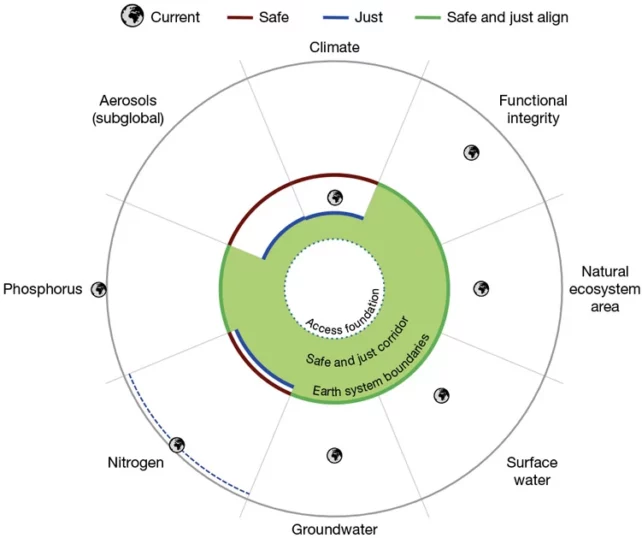
Earth Fails 7 of 8 'Safe Planet' Boundaries
Share
Our insatiable consumption patterns come at a significant cost to the interconnected web of planetary systems that rely on each other for sustainability. Like a series of dominos, instability in one area has a profound impact on others, leading to a precarious situation when these boundaries are breached.
Previous studies have warned that we have pushed some of these boundaries to the brink. However, while it is convenient to interpret our global ecology in this manner, it fails to account for the accessibility, or lack thereof, to essential resources.
A recent report by an international team of researchers sheds light on the issue of fairness and justice in relation to each field. The findings reveal that major components of our planet's life-support systems fail not just one or two boundaries, but a staggering seven out of eight, when considering equity.

As a result of our actions, the climate, biosphere, water cycle, atmosphere, and nutrient cycle on Earth have been severely disrupted, posing a significant threat to much of the world's population.
When justice is taken into account, certain scenarios start affecting specific regions of our planet much sooner, imposing stricter boundaries. For instance, aerosols pose a risk to the health of millions globally, with vulnerable groups suffering disproportionately despite contributing less to pollution.
The concept of "safe planetary boundaries" was initially explored in 2009 by some of the same researchers involved in this recent analysis, including climate scientist Johan Rockström from the Potsdam Institute for Climate Impact Research. At that time, the focus was solely on biophysical boundaries that Earth had surpassed. This updated approach introduces a justice threshold, encompassing human access to water, food, energy, health, and a clean environment.
Needless to say, the picture painted by this report is far from optimistic. "Science is showing clearly that we are at risk of destabilizing the entire planet," warns Rockström.
And yet, despite the evidence, the world continues to burn fossil fuels, produce synthetic chemicals, deforest land, deplete groundwater, contaminate rivers, and pollute the environment with fertilizers, plastics, hazardous chemicals, radioactive waste, heavy metals, and antibiotics.
Scientists assert that drastic changes are necessary, with climate action taking precedence. To remain within safe and just boundaries for all, Rockström and his colleagues argue that global warming should be limited to 1°C above pre-industrial levels. This target is considerably lower than current climate goals and well below the projected reality of approximately 1.2°C global average for 2023. Researchers stress that exceeding 1.5°C or 2.0°C warming significantly increases the likelihood of triggering irreversible tipping points, exacerbating biosphere damage and climate feedback loops. It is the most vulnerable, impoverished, and marginalized individuals who will bear the brunt of these consequences.
At 1.5°C warming, the current objective of the Paris Climate Agreement, an estimated 200 million people could face extreme temperatures, and 500 million could be exposed to long-term sea-level rise. Such figures far exceed the widely accepted principle of "leave no one behind" and undermine the majority of the United Nations' Sustainable Development Goals.
Phosphorus and nitrogen, two other crucial boundaries, stand out in the report. These nutrients, primarily leached into the environment through agriculture, can lead to harmful blooms of plant and algae life, causing fishery collapse and polluting drinking water. Earlier this year, scientists issued warnings of a looming "phosphogeddon" due to the mismanagement and rapid depletion of phosphorus, essential for crop growth.
The magnitude of the crises humanity currently faces is overwhelming. In the past month alone, we have witnessed food crises across the Horn of Africa, heat-related deaths in India, catastrophic floods in Italy
You’ve come this far…
Why not venture a little further into A.S.S. - our exclusive Australian Space Society.
And keep thrusting Australia into the deep unknown…
#Space_Aus




